
Duel in the Sun is a 1946 American psychological Western film directed by King Vidor, produced and written by David O. Selznick, and starring Jennifer Jones, Joseph Cotten, Gregory Peck, Lillian Gish, Walter Huston, and Lionel Barrymore. Based on the 1944 novel of the same name by Niven Busch, it follows a young orphaned Mestiza woman who experiences prejudice and forbidden love, while residing with her white relatives on a large Texas ranch.

Mae Busch was an Australian-born actress who worked in both silent and sound films in early Hollywood. In the latter part of her career she appeared in many Laurel and Hardy comedies, frequently playing Hardy's shrewish wife.

Jack Perrin was an American actor specializing in Westerns.
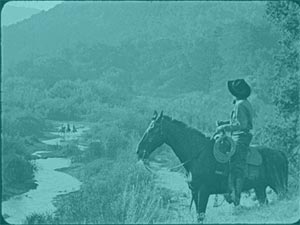
Bucking Broadway is a 1917 American silent Western film directed by John Ford, probably his sixth feature film. Long thought to be lost, along with about 60 of Ford's 70 silent films, it was found in 2002 in the archives of the CNC. It was subsequently restored and digitized and is available on the Criterion Blu-Ray of John Ford's Stagecoach.
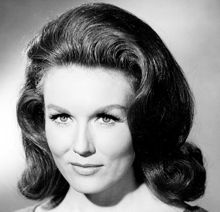
Elaine Devry was an American actress.

Ramona is a 1910 American short drama film directed by D. W. Griffith, based on Helen Hunt Jackson's 1884 novel Ramona. Through a love story, the early silent short explores racial injustice to Native Americans and stars Mary Pickford and Henry B. Walthall. A copy of the print survives in the Library of Congress film archive. The film was remade in 1928 with Dolores del Río and 1936 with Loretta Young.
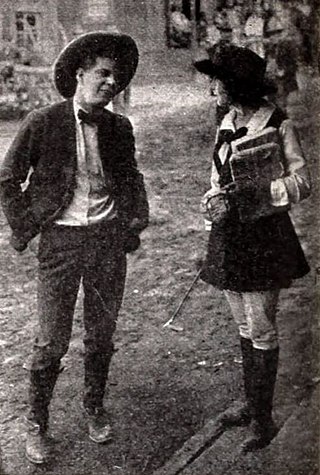
Headin' West is a 1922 American silent Western film directed by William James Craft and featuring Hoot Gibson. It is not known if the film survives.

The Show is a 1927 American silent drama film directed by Tod Browning, based upon Charles Tenney Jackson's 1910 novel The Day of Souls.

Amarilly of Clothes-Line Alley is a 1918 American silent romantic comedy film starring Mary Pickford that was directed by Marshall Neilan and written by Frances Marion based upon a novel by Belle K. Maniates.

The Mine with the Iron Door is a 1924 American silent Western film directed by Sam Wood and produced by Sol Lesser. The film is based on the novel of the same name by American author Harold Bell Wright that was published in 1923.
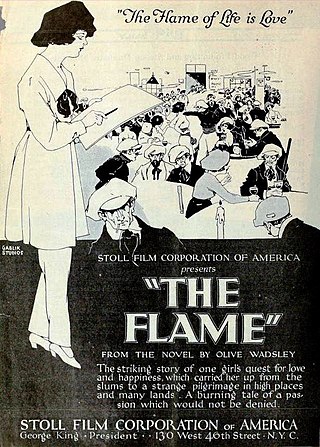
The Flame is a 1920 British silent romance film directed by Floyd Martin Thornton and starring Evelyn Boucher, Reginald Fox and Dora De Winton. It was based on a novel by Olive Wadsley.

Love Insurance is a lost 1919 American silent comedy film directed by Donald Crisp, produced by Famous Players–Lasky and distributed by Paramount Pictures. It is based on the novel of the same name by Earl Derr Biggers, Love Insurance.

Melody of Love is a 1928 American sound romantic drama film produced and distributed by Universal Pictures, directed by Arch Heath, which starred Walter Pidgeon and Mildred Harris, each their first sound film.
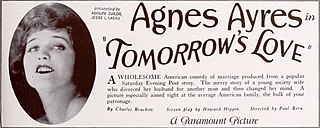
Tomorrow's Love is a 1925 American silent comedy film directed by Paul Bern, written by Charles Brackett and Howard Higgin, and starring Agnes Ayres. Pat O'Malley, Raymond Hatton, Jane Winton, Ruby Lafayette, and Dale Fuller. It was released on January 5, 1925, by Paramount Pictures.
Cassidy of Bar 20 is a 1938 American Western film directed by Lesley Selander and written by Norman Houston. The film stars William Boyd, Russell Hayden, Frank Darien, Nora Lane, Robert Fiske and John Elliott. The film was released on February 25, 1938, by Paramount Pictures.

Dead 7 is a 2016 post-apocalyptic zombie horror western film written by Nick Carter, directed by Danny Roew and produced by The Asylum. It aired on SyFy on April 1, 2016 in the United States.

The Branding Iron is a 1920 American silent drama film directed by Reginald Barker and starring Barbara Castleton and James Kirkwood. It was produced by Barker and Samuel Goldwyn and distributed by Goldwyn Pictures. Castleton appeared nude in the film, which caused the particular scene to be cut in some parts of the country. Pennsylvania banned the film altogether due to the topic of infidelity.

Red Hot Leather is a 1926 American silent Western film directed by Albert S. Rogell and starring Jack Hoxie, Ena Gregory, and Billy Engle.
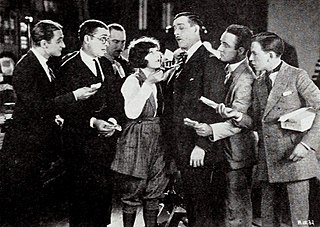
Boy Crazy is a 1922 American comedy film directed by William A. Seiter and written by Beatrice Van. The film stars Doris May, Fred Gamble, Jean Hathaway, Frank Kingsley, Harry Myers, and Otto Hoffman. The film was released on March 5, 1922, by the Robertson-Cole Distributing Corporation. With no copies listed as being held in any film archive, it is likely to be a lost film.
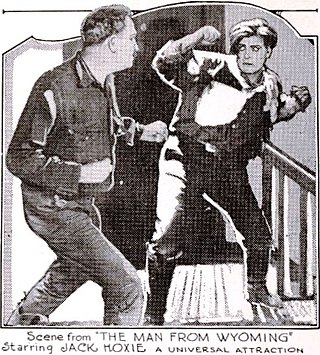
The Man from Wyoming is a 1924 American silent Western film directed by Robert N. Bradbury and starring Jack Hoxie, Lillian Rich, and William Welsh.



















